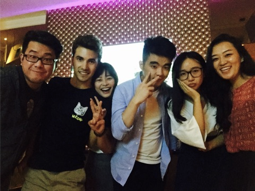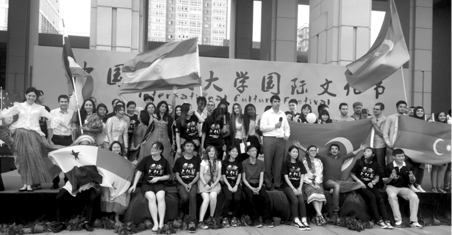China : three M2i students relate their experience
China: three M2i students relate their experiences

As a student in international management, whether you are interested in China and the Chinese culture or not, you may be led to encounter Chinese people in your professional life. You may have the opportunity to travel there, whether it is in your leisure time or in your work life. But before going there, it is worth having an insight into what you should know about Chinese people. 3 M2i students relate their different experiences in China.
Why did you go to China?
Last year I went to Beijing for 4 months to teach two children English and French. I lived with the family. It was strange because the two kids lived with their nanny but the parents didn’t stay with them. The father came one or two times per week to spend some time with his kids. One aspect which really caught my attention was that he dedicated all his attention to his son and favorised him but didn’t pay much attention to his daughter. She was always punished and the son had all the liberties. The nanny had the same attitude towards the boy. He had all the attention, got some extra food, more affection and special treatment. The daughter didn’t always understand the behaviour of the others and you could see that she was sad.
Was the nanny living in the same conditions as she would in European families?
The situation of the nanny was complicated. Her family lived far away, in a small town in the countryside. She saw her husband and her kids just one or maximum two times a year. She spent all the time, 7 days per week, 24 hours a day, with the kids. She had no days off like we have in Europe. She had to do everything that the father said and go wherever the kids had to go. She had no private life or time for herself. At the end of my stay she told me that she would like to buy some clothes for herself and that the last time she went shopping was 3 years ago, when she started to work there. She and the children even slept in one room together, in the same bed. The nanny didn’t speak any other language and her Chinese accent was strong and I often had difficulties to understand her. The first weeks there were the most difficult. I often had the impression that she was distant with me and didn’t make any efforts to talk to me. I often asked her if I could go play with the girl and she always said no and didn’t give me any explanation. At the end of my stay, she told me that it was because the girl was sick. We found a solution by writing to each other or by asking the kids to translate. But as the time passed and I better understood Chinese, I noticed that sometimes they translated something else, to my disadvantage.
Did you notice any difference between European kids and Chinese kids?
Yes, the way they teach them. For example, in China they have less creative activities. When I asked them to draw something without a model, or to build a zoo with pre-cut animals, it was really difficult for them. They didn’t know what to do. On the other hand, at 5 years old they already spoke 3 languages, Chinese, English and French.

What can you say about your integration in China ?
Well, it’s a combination of things. When I first arrived in China I thought it was the best opportunity to blend in with the local population, and the best opportunity to learn the language as I was in the country.
When you arrive, the language local people speak sounds a lot different from what you’ve learned at school, you might get destabilized. You might want to speak English because it’s easier, and you still get understood by some people. You might also want to hang out and spend your time with people from the same country as you. But here is the most important step: you have to resist the urge to go down an easier path, you have to choose the difficult one. And the more difficult it is, the more effort will be required. So as I started taking classes in the university I also decided to take part in a lot of different activities and clubs to meet new people and make new friends. And at the end, you end up having a whole bunch of new friends. Friendship is one of the most important things when you are away from home. To me, being successfully integrated is one of the most rewarding things of your stay, when you feel being a part of the country you stay in.

What should a French student be aware of before going to China ?
When you go to China or meet with a Chinese person, you should be aware of the “face” (面子, miànzi). In China, saving face is important as it is a matter of respect. Basically, it means that you shouldn’t embarrass or shame the other person, especially in public, or you will make them « lose face ». This works as well when negotiating in a flea market: try to avoid negotiating when you don’t actually want to buy something, because some shopkeepers can be pretty upset and will tend to try and force you to buy things.
Another key part of China is « guanxi » (关系, guānxi), a concept based on relationships and networking. If you ever work in China, do not hesitate to take the time to get to know people on a personal basis to enrich your network. Just a little small talk will make people enjoy your company rather easily, which in the long run allows you to build up trust and friendship and will offer you many opportunities : invitations, job offers, travels and so on. If you are in China to study, do not hesitate to take part in any events or associations offered by the university.
Any practical advice to fit in rapidly?
Maybe one of the most important pieces of advice I can give you is to download Wechat (微信wēixìn). Don’t feel lost because most Western social media (ie. Facebook, Google, Instagram…) are not allowed in China. By using Wechat, you will realize that you don’t really need any other apps. It allows you to make in-store payments from anywhere, lend money to a friend or even book a taxi. You can do almost everything, just as long as you have a phone and link your bank account to the app. I stayed in Beijing for a year and I still regret the fact that I wasn’t aware of this app sooner.
Final word
China has a lot to offer, with its unique culture you have a lot to learn from the giant!
Don’t be afraid to try everything you can! You will experience China’s unique blend of ancient and modern civilization, as well as its scenic beauty and bustling nightlife. Visit new places with other students from around the world who you meet, and you’ll find yourself opening your eyes not just to China, but to the whole world.
You’ll run into unique customs as you travel to different parts of China, but everyday life, believe it or not, will be just as new and fulfilling. Living and interacting with local Chinese and immersing yourself in Chinese society will provide you with a new way of visualizing the world and giving you the kind of insight that just doesn’t come from textbooks.

This article was written by:







